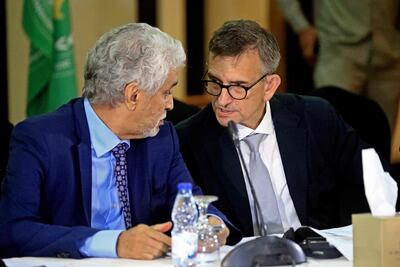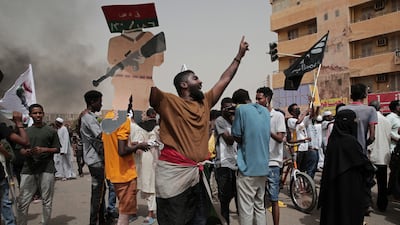A major pro-democracy alliance in Sudan has called for the military to be excluded from the democratic transition to end the country’s political crisis.
The two-page blueprint for democracy also called for elections under international supervision after 18 to 24 months.
The Forces of Freedom and Change, or FFC, was the military’s chief partner in a transitional administration that took office shortly after the April 2019 overthrow of dictator Omar Al Bashir.
But a military coup led by army chief Gen Abdel Fattah Al Burhan last October ended that partnership, derailing a fragile democratic transition and plunging the already battered economy deeper into crisis.
There have been near daily protests against military rule since the October 25 coup, with at least 102 protesters killed by security forces and more than 5,000 injured, figures released by the UN and medical groups aligned with the opposition show.
The latest protester death — 28-year-old Hashem Mirghany Ibrahim — occurred on Thursday.

The FFC, whose representatives held five hours of talks with three top generals last week, said the military must take steps towards creating a climate that is conducive to the restoration of the democratic transition.
This, it said, should include the “immediate and effective” lifting of the state of emergency declared by Gen Al Burhan when he seized power nearly eight months ago.
Gen Al Burhan lifted the state of emergency last month, but the FFC contended in its blueprint that some measures, such as granting security services immunity and far-reaching powers, remained in force.
The military must also release all political detainees, drop some of the criminal charges brought against them and take steps to protect civilians in restive regions such as Darfur and Kordofan.
Allowing supporters of the Al Bashir regime to reclaim the government jobs from which they had been fired must stop, said the blueprint, and restrictions on the press must be lifted.
Touching on a thorny subject, the FFC said both the military and the security apparatus must be reformed.
“[There must be] one professional and national army that protects both country citizens,” it said.
The army, it added, must stay out of politics and the armed forces must also be purged of elements loyal to Al Bashir’s regime.
The FFC’s mention of “one” army appears to be a veiled reference to paramilitary and rebel forces that operate independently from the armed forces, both in Khartoum and in outlying areas of the vast Afro-Arab nation of 44 million.
The main concern for the pro-democracy movement in this regard has been the Rapid Support Forces, whose roots are in a notorious Darfur militia — the Janjaweed — that fought for the government against non-Arab rebels during the war in the region in the 2000s.
It is widely held responsible for widespread abuses against civilians during the war.
The paramilitary RSF is led by Gen Mohamed Hamdan Dagalo, Gen Al Burhan’s deputy on the ruling, military-led Sovereign Council.
Gen Al Burhan and his top generals have repeatedly said they would only surrender power to an elected government or when Sudanese political forces reach a consensus on how the country should proceed politically.
They have also rejected talk of reforming the military or placing it under civilian oversight, arguing that the military is the guardian and defender of the nation — a notion rejected by the opposition.
The FFC document also envisioned a small and entirely civilian Sovereign Council to act as a symbol of the state but without any executive powers.
The pro-democracy groups that led the uprising against Al Bashir in 2018-2019 should pick a new prime minister who, in consultations with the revolutionaries, will select Cabinet members known to be loyal to the principles of the revolution — freedom, peace and justice — the document added.
A “limited” assembly, in which women make up 40 per cent of members, should be appointed to legislate for the transitional period.
The demands listed in the FFC document mirror those voiced by other pro-democracy groups such as the Resistance Committees, which have been leading the anti-military protests since October. The committees, however, also demand that the generals be held accountable for the killing of protesters.
The military has yet to comment on the FFC document, but the generals are likely to reject it as a basis for a solution.
“Our enemy is the same one and if we are to bring down the coup regime, we must unite,” said senior FFC official Wagdy Saleh.
He called on all “revolutionaries” to rally on the streets for a “showdown” against the military on June 30, the anniversary of the military coup that brought Al Bashir to power in 1989.

The June 9 meeting between the FFC and the three generals took place a day after the opening of a national dialogue on the country’s political future that has been enabled jointly by the UN, African Union and the regional Intergovernmental Authority on Development.
The session was boycotted by all opposition groups that saw the process as legitimising military rule. The boycott left the military sitting around the negotiating table with its supporters, including rebel leaders who signed a peace deal with the generals in 2020 and have since become their staunch supporters.
The trio of the UN, AU and IGAD indefinitely postponed the dialogue before it was to hold its second session on June 12, throwing into doubt the future of the process they had spent months preparing for.












